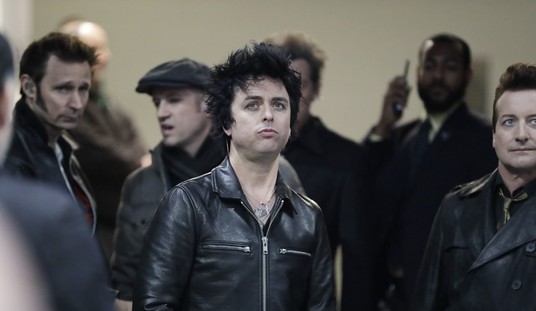In mid-October 2023, on Joe Rogan’s podcast, this happened. (WARNING: Profanity)
Yes, that is Rogan, wearing a spacesuit and smoking a blunt, singing along with and raving over “Why Don’t You Look Into Jesus” by Larry Norman. While Rogan gets the song’s release year wrong (it was 1972, not 1970), it is still a remarkable moment.
I am reminded of Brandon Morse’s recent VIP post here titled “Christ Can Save Anyone, Including OnlyFans Stars.” Much as we’re seeing now with social media mavens slagging on Nala Ray, insisting she couldn’t possibly be a Christian, let alone be used by Jesus, because of her past, so Larry Norman was chastised and ostracized by Christians in the 1960s and 1970s and even afterward for wearing his hair too long, playing rock’n’roll, and singing about something other than gentle Jesus meek and mild 24/7.
I don’t know what’s in Joe Rogan’s heart. I do know that God is using Larry Norman, years after his ascension into heaven, to speak truth to Rogan. Isn’t that the idea — to speak the truth about Jesus to the world?
The latest episode of Cephas Hour, available at the show’s website, talks about telling the truth by repeating what Jesus said, plus a look at how renewal of faith is not a nostalgia exercise and the difference between hoping for something and being hopeful. You can listen to the show on demand at its website. I hope you find it a blessing. Thanks.
Jesus said,
“Do not suppose that I have come to bring peace to the earth. I did not come to bring peace, but a sword.”
However, He did not come to bring a sword in the manner that many of his followers were hoping. They wished for Jesus to be a political and military ruler who would raise opposition to the Roman occupiers of Israel. The weapon He wielded then — and wields to this day — is far more potent, a sword even more deadly and violent than all the weapons flashed in the past, present, and future wars. It is the weapon of war between souls.
Returning to Jesus’ words, He said,
“For I have come to turn
‘a man against his father,
a daughter against her mother,
a daughter-in-law against her mother-in-law —
a man’s enemies will be the members of his own household.’”
There is no more significant strife than that between those who should be one, yet for whatever reason, are profoundly and sadly often irrevocably apart.
Yet, in a seeming paradox, we are called to simultaneously battle against those who bring evil and extend an offer of peace, provided they lay down their weapons and turn their hearts to God. It is a strange and curious battle we fight. We seek to eliminate the enemy by destroying them, but only as a last resort. Instead, we seek to destroy the evil within them so that they see the error of their ways and willingly demolish that within them that makes them our enemies — and, far more critically, God’s enemy. On the surface, it makes no sense. But, when we consider the battles raging within our hearts, our own amply demonstrated capacity for wrongdoing, and how Christ has forgiven us, it does make sense.
Those of us who have been believers for any length of time remember, with a mixture of nostalgia and embarrassment, the heady days of our newfound faith. We were the unstoppable young lions, burning with fervor and an overriding knowledge that we would — with God’s help, of course — bring the world to Him. Nothing seemed impossible. Everything was within our grasp.
Time went on. We grew, or at least hopefully did so. Bitter experience taught us that, whereas once we had all the answers, often there were times when we didn’t have so much as the questions right. Doubt and disillusionment crept into the fabric of our faith.
Yet we still believed and, in time, found our faith renewed not as an exercise in nostalgia but rather the reinvigoration of that which was real. There is great joy when you realize you don’t have to spend your walk with God reinventing the wheel so you can keep up with Him. God has been faithful all along and continues to be faithful. If we but cling to Jesus, it will be all right.
There’s a difference between being hopeful and hoping. Let me explain.
Hoping is happiness. There’s nothing wrong with happiness. Who doesn’t want to be happy? As Solomon wearily wrote in Ecclesiastes:
I know that there is nothing better for people than to be happy and to do good while they live.
So what’s the problem with being happy? Nothing, really. Other than how much better it is to find joy. Finding joy requires not hoping, but rather being hopeful.
To be hopeful is not expecting immediate results. That’s what hoping is for, taking happiness from our present circumstances. To be hopeful is to find joy in the Lord instead of our immediate surroundings and perceived future prospects. That’s why James wrote:
Consider it pure joy, my brothers and sisters, whenever you face trials of many kinds, because you know that the testing of your faith produces perseverance.
Let’s be honest. Going through trials does not constitute going to our happy place. Finding joy in the Lord is not the same as wishing for Jesus to please us with blessings from above. But it digs much deeper and is ultimately much more satisfying.













Join the conversation as a VIP Member